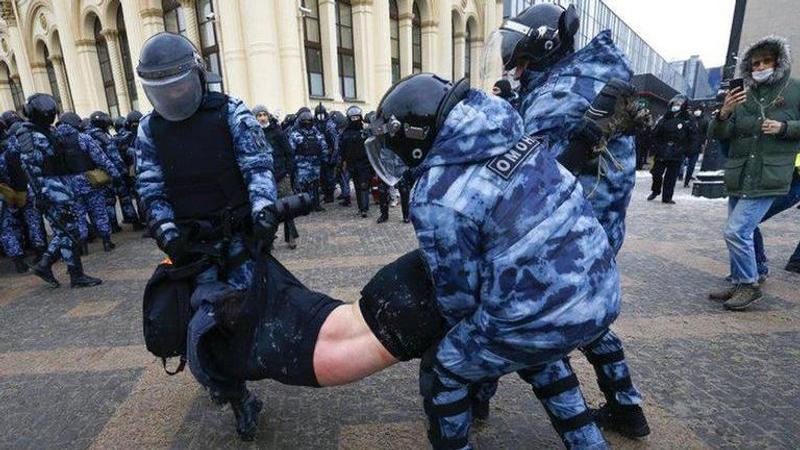Published 13:02 IST, February 4th 2021
Russia struggles to accommodate detained protesters
Russian protesters spent hours packed inside vehicles and lodged in corridors of detention centres as authorities struggle to accommodate thousands of people arrested during the rallies sparked by the arrest of the opposition leader Alexei Navalny.

Russian protesters spent hours packed inside vehicles and lodged in corridors of detention centres as authorities struggle to accommodate thousands of people arrested during the rallies sparked by the arrest of the opposition leader Alexei Navalny.
More than 10,000 people across Russia were detained at the protests that started less than two weeks ago after Navalny was arrested upon his arrival from Germany.
Most of them, more than 4,000 were in Moscow, according to OVD-Info group that documents arrests.
Detained at the rallies and sentenced to spend several days or weeks in jail, many were left inside police vans transporting them from police precincts and courts for more than 20 hours due to overcrowding in prisons.
A video showing dozens of detainees squeezed inside a police van recently went viral on social media.
One of the protesters, Stanislav Korenyugin, read the statement on camera complaining of spending more than 9 hours standing inside the van without proper food.
"More than 40 hours passed since the detention and we are still suffering torture," he said.
Their van was one of several standing outside the deportation centre 70 kilometres (43 miles) away from Moscow, which was urgently transformed into a detention centre in the absence of prison space.
All Moscow jails can only accommodate 150 people arrested under administrative articles, the case for most protesters.
On Wednesday, dozens of relatives queued outside the centre for hours to bring food and necessities to their loved ones.
A mother of a detained protester, Tatiana Yastrebova was among the lucky ones to be in the first dozen of relatives who brought a care package.
She waited for 6 hours.
"The queue moves slowly, extremely slowly, she said. "There are 150 people queuing."
The few detainees who had spent their term in custody and were released said they spent a whole day in a police van either breathing in fumes from a running engine or suffering from the cold.
"Several people were standing all that time because it's (police van) intended for 15 seats, while they were loading it with more than 20," said Almir Shamasov who spent 10 days in custody.
Eva Sokolova slept two nights on the floor of a police precinct before the court jailed her for three days.
"There were four of us in the holding cell who slept on the floor on the mattress with single-use sheets, without pillows and blankets," she said after leaving custody.
The number of arrested people is unprecedented, believes Marina Litvinovich, a member of Moscow's Public Monitoring Commission that monitors the treatment of prisoners and detainees.
"The jails got full very quickly. The first collapse, the first crisis occurred when police vans and buses (with detained protesters) were driving around Moscow anxiously and jails didn't let them in. They didn't know where to put people," she said.
Newly transformed Sakharovo detention centre now accommodates around 400 detainees, said Litvinovich.
It's capable to take 400 more.
"It's the beginning of the process when these jails will be always full, she added. I think people will keep protesting and authorities will remain brutal."
A prison sentence for Russian opposition leader Alexei Navalny and a sweeping crackdown on protesters demanding his release reflect the Kremlin's steely determination to fend off threats to its political monopoly at any cost.
Russia has seen mass protests before, of course and it has used various tactics to confront them, ranging from offering concessions to violently cracking down.
The current wave of demonstrations, however, has spread across Russia's 11-time zones, a marked difference from the past when crowds were mostly limited to Moscow.
Tens of thousands of people have taken to the streets in recent weekends in the largest and most extensive outpouring of anger against President Vladimir Putin's rule in years.
Police detained around 4,000 protesters across Russia on January 23 and more than 5,750 on January 31, according to the OVD-Info - the largest number of detentions since Putin was first elected in 2000.
During the demonstrations after Navalny's sentencing on Tuesday, they made more than 1,400 arrests, nearly 1,200 of them in Moscow.
Most of those detained were released after being handed court summons - but they faced fines and jail terms ranging from seven to 15 days.
A few dozen accused of violence against police have faced criminal charges that could land them in prison for years.
Updated 13:02 IST, February 4th 2021




